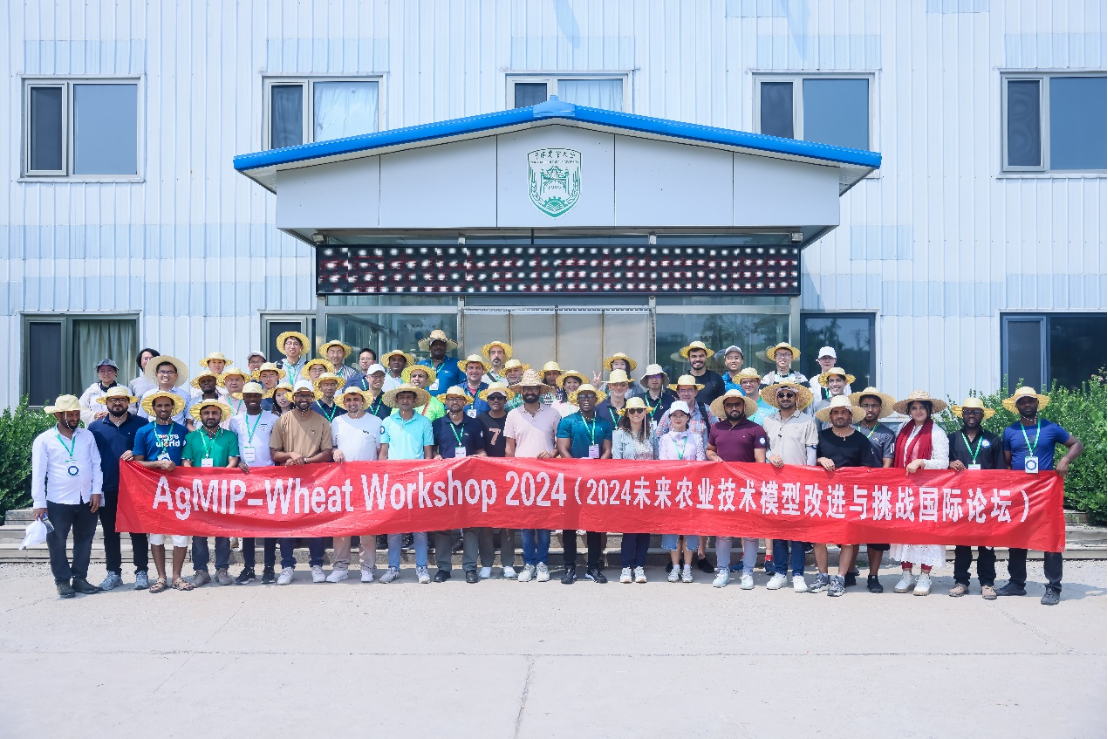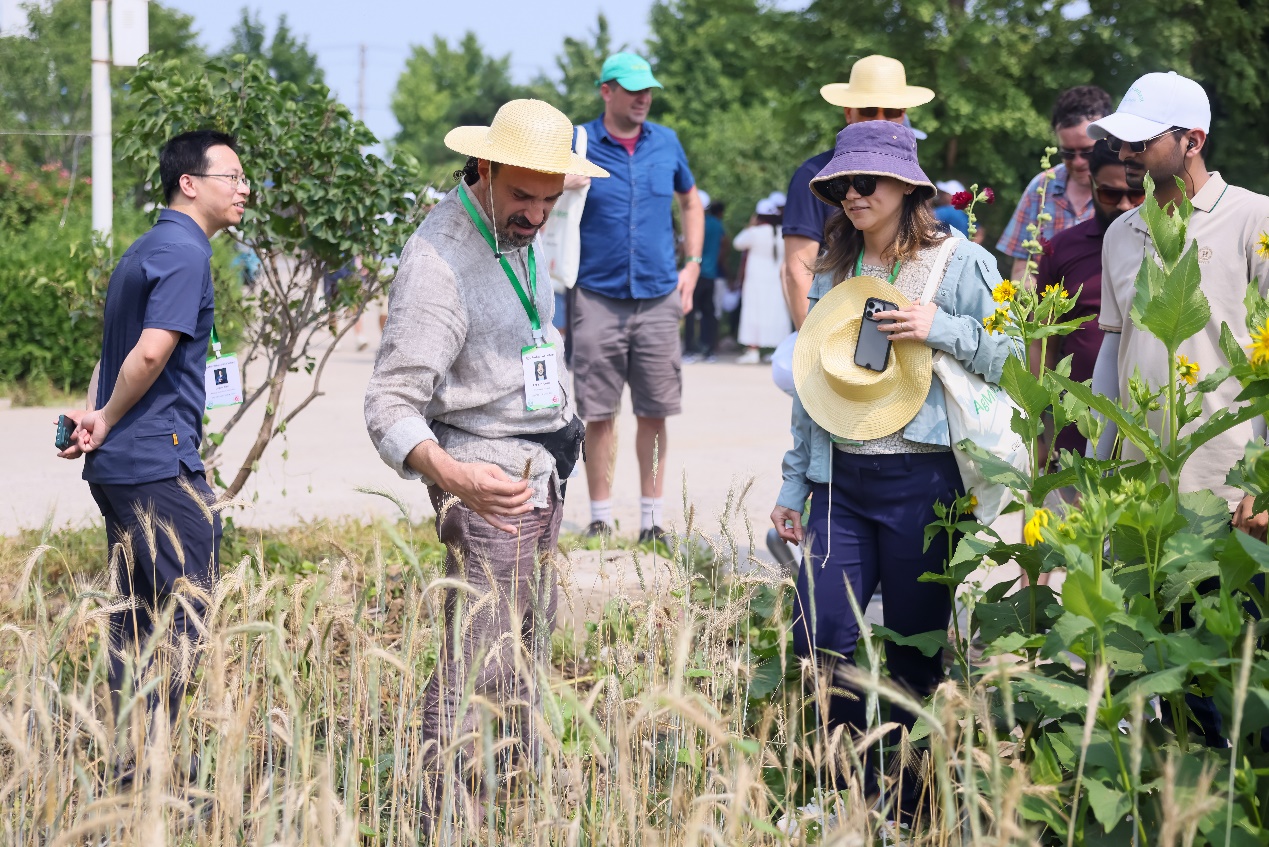
-
The “AgMIP-wheat” and “2024 International Forum on Future Agricultural Technology Model Improvement and Comparison” Held at China Agricultural University
2024-07-17
From July 9 to 12, the "AgMIP-Wheat Workshop" under the framework of the International Agricultural Model Comparison and Improvement Project and the "2024 International Forum on Future Agricultural Technology Model Improvement and Comparison" was grandly held at the West Campus of China Agricultural University. Experts and scholars from 25 countries, including the United States, Germany, the United Kingdom, France, Denmark, Spain, Italy, Mexico, India, Brazil, Australia, Pakistan, Ethiopia, Egypt, South Korea, Tunisia, Bangladesh, and China, gathered in Beijing to exchange the latest research results and future actions. The forum focused on addressing common international issues and needs under the background of global warming and extreme climate events, leveraging the dynamic, intelligent, and precise advantages of models to build a collaborative platform for global agricultural model researchers and young scholars.

Since its establishment in 2010, the Agricultural Model Intercomparison and Improvement Project (AgMIP) has conducted research on agricultural models, climate change, and precision agriculture, with over a thousand scientists worldwide collaborating closely and achieving many significant results. It has become one of the most influential international platforms for agricultural research and innovation globally.
The international forum was co-hosted by the Department of Meteorology, the System Simulation and Software Technology Laboratory, and the High-Level Innovation Team for Climate Change Impact and Adaptation in Agriculture at the College of Resources and Environmental Sciences of China Agricultural University, along with the China Futures Research Society, the Fengtai District Committee of the China Zhi Gong Party, and the National Key Laboratory of Smart Agriculture Technology and Systems. The opening ceremony was presided over by Professor Zhao Chuang, the chairman of the conference and the head of the Department of Meteorology at China Agricultural University. Professor Yuan Lixing, the dean of the College of Resources and Environmental Sciences, delivered a speech on behalf of the organizers, warmly welcoming experts and scholars from afar and hoping that this grand event would ignite new sparks of ideas through full exchanges and collisions, contributing wisdom and strength to global food security and sustainable development.
The forum featured high-quality academic exchanges. Professor Senthold Asseng from the Technical University of Munich, the head of "AgMIP-wheat," introduced the overall situation of the AgMIP wheat model research system. Alexander Clark Ruane, a researcher at NASA, presented the overall progress of the AgMIP project. Professor Pierre Martre from the French National Institute for Agricultural Research (INRA) introduced the latest developments in wheat model comparison and improvement. Researcher Tao Fulu from the Institute of Geographic Sciences and Natural Resources Research, Chinese Academy of Sciences, discussed the research progress of AgMIP in Asia. Deputy Director Yuan Jiashuang of the National Climate Center introduced the basic work and latest progress of the Intergovernmental Panel on Climate Change (IPCC).
Experts from 45 different institutions, including the International Maize and Wheat Improvement Center, Wageningen University in the Netherlands, Columbia University in the United States, the University of Oklahoma, Kansas State University, the University of Florida, Rothamsted Research in the United Kingdom, the University of Hohenheim in Germany, China Agricultural University, the Chinese Academy of Sciences, and the Henan Institute of Meteorological Science, exchanged and discussed issues existing in the model simulation process, particularly on how to overcome the difficulties of future agricultural models in extreme climate events and comprehensive management. They reached a consensus on strengthening future model simulation capabilities, organically integrating with artificial intelligence, and reducing uncertainties.
The forum's convening has expanded the global influence of Chinese agricultural models, contributing Chinese wisdom to global climate change and food security. Experts from various countries also discussed how to further strengthen international cooperation under the AgMIP framework through agricultural cooperation projects between China, the European Union, and the United States, particularly enhancing cooperation and exchanges among young agricultural scientists worldwide. China Agricultural University expressed its willingness to host the 11th AgMIP Global Conference.
During the conference, domestic and foreign experts visited the Department of Meteorology of China Agricultural University and inspected the Shangzhuang Experimental Station and other bases. Invited by the China Futures Research Society, they visited the Great Wall at Badaling, the Beijing Folklore Museum, and the Shijia Hutong Museum, experiencing the charm of China's excellent traditional culture and Beijing's unique cultural characteristics.

Experts attending the forum included Professor Yang Xiaoguang, head of the High-Level Innovation Team for Climate Change Impact and Adaptation in Agriculture at China Agricultural University, Professor Cheng Ping, director of the Belt and Road Professional Committee of the China Futures Research Society, Senior Engineer Kang Shigong, deputy director of the Science and Technology Committee of the Fengtai District of the China Zhi Gong Party, and Professor Feng Liping, deputy director of the Agricultural Modeling and Simulation Professional Committee of the Chinese Association for System Simulation and professor at China Agricultural University.
More than 200 experts from domestic universities, research institutions, and enterprises, including the Chinese Academy of Sciences, Peking University, Zhejiang University, Nanjing Agricultural University, Northeast Agricultural University, Xinjiang Agricultural University, the Henan Institute of Meteorological Science, and the Beidahuang Group, participated in the conference. The opening ceremony and the first-day reports were live-streamed online, with a viewing count reaching 25,825.
By Zhao Jin / Photos by Kang Shigong